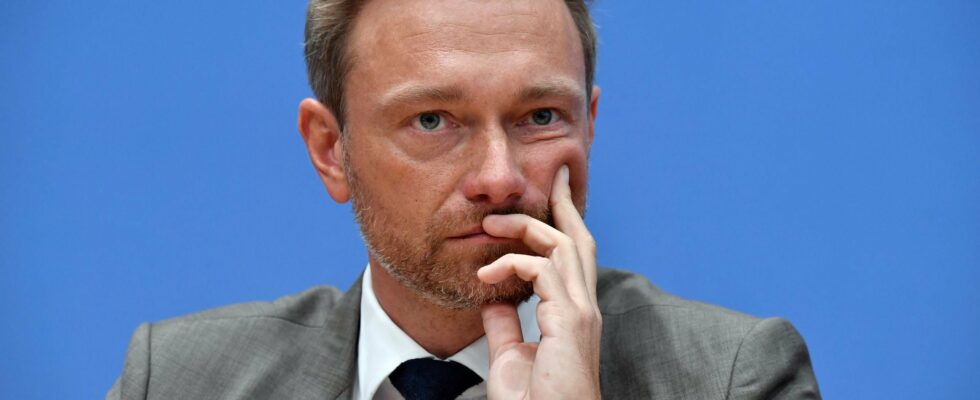Two competing “industry summits”, organized without consultation on the same day, this Tuesday, October 29, by the Chancellor on one side and by the Minister of Finance on the other. Quite a symbol of the cacophony which has reigned for several months within the government of Olaf Scholz, between the Chancellor and his liberal Minister of Finance, Christian Lindner, who threatens to leave the government before the end of the legislature. Champion of budgetary discipline, which he has made his credo, Christian Lindner behaves in this “government of progress” like an obstacle to going in circles. The leader of the small liberal party (FDP) is a fervent defender of the thermal engine, unlimited speed on the highways, the maintenance of nuclear energy, cash and the reduction of social spending.
In essence, Lindner is in permanent disagreement with Chancellor Scholz, but also with his environmentalist allies. “He has behaved from the start like an opposition leader within the government to which he belongs,” summarizes Markus Linden, political scientist at the University of Trier. “His tactic is to sharpen his liberal profile by making proposals that are not those of his allies,” he adds. For him, the end of the coalition was always an option. And she’s getting more and more serious.
A government exit strategy before Christmas
Less than a year before the general elections, scheduled for September 28, 2025, the Liberals are in fact studying, behind the scenes, a strategy to exit the government before Christmas. Since the start of the school year, Christian Lindner has cast doubt on his retention in power by using ever more ambiguous formulas. “The fall will be that of decisions,” he threatened at the end of the summer without specifying what he meant by “decisions.” When asked by L’Express at the end of October whether he still intended to remain minister until the end of his term, he declared: “When a government obtains results, when the demands of citizens are met, then it would be foolish not to pursue it,” he said.
However, the government has not obtained results for a long time and it is on the verge of imploding on the 2025 budget, which is still not finalized. Nobody sees how this minister could still come to an agreement with Olaf Scholz before the end of the mandate. Christian Lindner takes shots at Olaf Scholz, but also at his environmentalist ally, the bête noire of all German populists. “Financial policy cannot correct the errors of economic policy,” he said to his colleague Robert Habeck, the Green Minister of the Economy and vice-chancellor, whom he criticizes for a “ conceptual impotence.
While Olaf Scholz wants to relax the sacrosanct German “debt brake” to revive an economy in recession for two years, Christian Lindner continues to swear only by the budgetary discipline enshrined in the Constitution, but also in the “European Stability Pact”, which the majority of EU countries have not respected for a long time. “Brussels is stricter than the German rules. This means that we will undoubtedly have to make more savings in 2025,” he insists to add fuel to the fire. Christian Lindner also welcomes the “turning point” in budgetary policy in France to “avoid a new financial crisis”. “I share the position of my French counterpart who himself says that the deficit is a threat to the country. […] Nothing […] would be more dangerous than plunging back into the financial crisis of 2008,” Christian Lindner tells us.
Refusing any pooling of public debts in Europe, the liberal minister is outbidding populism light by demanding in particular “the end of taboos [sur l’immigration]”. “The billions spent on irregular immigration […] It’s billions!” he complains. He called for the removal of the right to the minimum solidarity allowance for Ukrainians with a switch in their status to that of refugees. An unacceptable demand for his two left-wing allies By leaving the coalition prematurely, the liberals hope to escape a serious existential crisis because the FDP, which has always been a king or queen maker, is on the verge of disappearing from all parliaments in Germany.
Nobody believes in the future of the Liberal Party anymore
During the last regional elections, in September, he achieved scores of less than 1%. This is the beginning of the end for a party which has four ministers in the federal government. All the polls confirm that they will not be able to regain their seats in the Bundestag at the end of 2025. An electoral collapse of which Scholz and environmentalists would be the cause: “Our voters tell us that we are doing too much ecology and social “, justifies Christian Lindner.
In this context, early elections would give time to wage a campaign against the Chancellor and his environmentalist allies. But this “scuttle” strategy is risky. Because no one believes in the future of the liberal party anymore. “The fear of dying pushes the liberals to suicide,” quips the ecologist Johannes R. Becher, vice-president of the parliamentary group in Bavaria, who encourages them to “stay in edge”.
In absolute terms, Christian Lindner could announce his withdrawal from Olaf Scholz’s government from November 14, the date of a meeting which promises to be contentious at the budget committee of the Bundestag to complete the 2025 finance law. “The Chancellor will then have to ask the question of confidence in the Bundestag and call early elections at the same time as the Hamburg elections, at the beginning of March”, explains Markus Linden, who adds that Christian Lindner has “several times” broken coalitions in his career. The Germans have not forgotten that he had already plunged Germany into one of the most serious political crises in its history by derailing the coalition negotiations between the conservatives and the ecologists in 2017. “It is better to give up governing rather than govern badly,” he declared to justify his decision. Everything is said.
.
